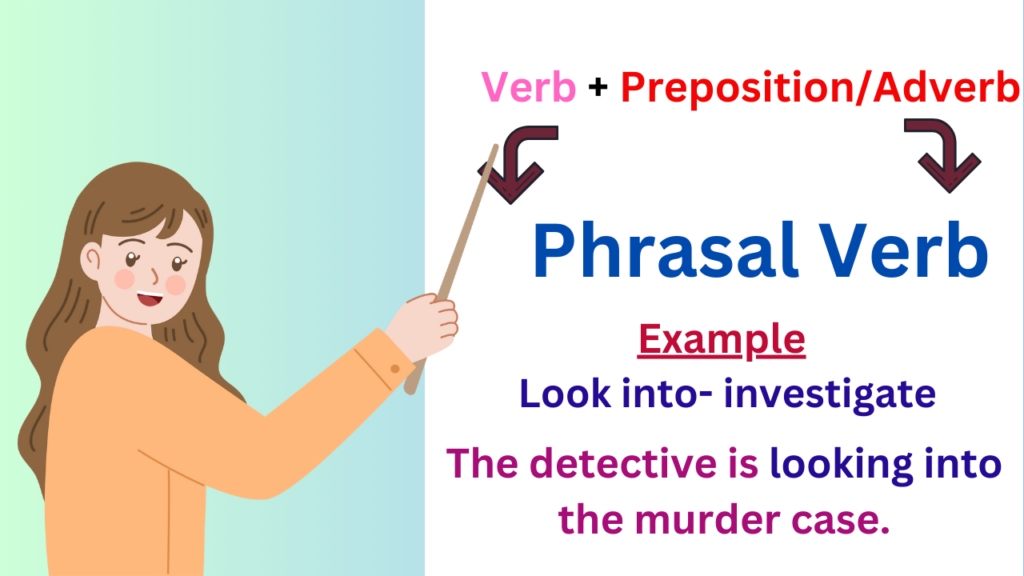50 Essential Phrasal Verbs You Must Know to Speak English Fluently

Introduction:
Phrasal verbs are often used to make conversation more fluid and natural. However, they can be tricky to master, especially, for beginners. Phrasal verbs can take your English to the next level whether used in writing or speaking.
Phrasal verbs are formed by combining verb + preposition or adverb (sometimes both). These combinations often give a completely different meaning than the individual words. In this blog post, we’ll discuss 50 essential phrasal verbs, with easy-to-understand explanations.
What Are Phrasal Verbs?

Phrasal verbs form by adding a verb (like “take,” “go,” or “look”) with a preposition or adverb (like “up,” “in,” or “after”). These combinations result in a new meaning, which is often totally different from the meaning of the original verb.
For example:
- “Take” means to grab something.
- “Take off” means to leave or when a plane leaves the ground.
Why are they Important?
- Phrasal verbs are frequently used in everyday English conversations to sound more natural.
- They help in conveying long thoughts in a concise manner .
- Knowing phrasal verbs gives you the confidence to understand and communicate more effectively, especially in social and professional contexts.
Categorized guide to Essential phrasal verbs:
1. Phrasal verbs for Daily Activities
These phrasal verbs are commonly used when talking about routine tasks, making them handy for everyday conversations.
Get Up
Meaning: To rise from bed.
Example: I usually get up at 7 a.m. every day.
Run Out Of
Meaning: To consume all of something.
Example: We ran out of fuel while driving to Jaipur.
Put Off
Meaning: To postpone something.
Example: They decided to put off the meeting until next week.
Turn Off / Turn On
Meaning: To switch off or on a device.
Example: Please turn off the lights when you leave the room.
Eat Out
Meaning: To have a meal outside the home.
Example: We decided to eat out at the new restaurant in Connaught Place.
2. Phrasal verbs for Communication

These phrasal verbs are useful during interactions, meetings, or conversations.
Bring Up
Meaning: To mention a topic or to raise a child.
Example: He brought up an interesting point during the meeting.
Call Off
Meaning: To cancel an event or meeting.
Example: They had to call off the meeting due to heavy rain.
Come Across
Meaning: To find something or someone unexpectedly.
Example: While traveling to Shimla, I came across a beautiful temple.
Look Up To
Meaning: To admire or respect someone.
Example: Many people look up to their teachers for guidance.
Call Back
Meaning: To return a phone call.
Example: I missed his call, so I’ll call him back in the evening.
3. Phrasal verbs for Emotions
These phrasal verbs help express how you feel or describe others’ emotions.
Cheer Up
Meaning: To make someone feel happiness.
Example: She tried to cheer him up after his loss.
Calm Down
Meaning: To relax after being angry or upset.
Example: People often meditate to calm down after a stressful day.
Break Down
Meaning: To become very emotional or to stop functioning (for machines).
Example: She broke down in tears after hearing the news of her father’s death.
Get Over
Meaning: To recover from something emotionally or physically.
Example: It’s hard for students to get over exam stress, especially during board exams.
Give Up
Meaning: To stop trying.
Example: Many students give up too soon after failing their first attempt at competitive exams.
4. Phrasal Verbs for Work or Studies
These phrasal verbs are particularly useful when talking about work or school.
Keep Up With
Meaning: To maintain the same level as someone else.
Example: She works hard to keep up with her colleagues.
Wrap Up
Meaning: To finish or complete something.
Example: Let’s wrap up the meeting before lunch.
Take Up
Meaning: To start doing something new.
Example: Many professionals take up online courses to upgrade their skills.
Hand In
Meaning: To submit something (like homework or a project).
Example: Don’t forget to hand in your assignment by Friday.
Set Up
Meaning: To arrange or establish something.
Example: She set up her own home-based business selling handcrafted products.
5. Phrasal Verbs for Travel or Movement
When you’re talking about travel, movement, or changes in location, these phrasal verbs can be helpful.
Take Off
Meaning: For an airplane to leave the ground or to become successful suddenly.
Example: Her business took off after she started selling products online.
Set Off
Meaning: To begin a journey.
Example: We set off for Goa early in the morning.
Drop Off
Meaning: To take someone to a place and leave them there.
Example: Can you drop me off at the station?
Check In
Meaning: To register at a hotel or airport.
Example: We checked in at the hotel around 3 p.m.
Get On / Get Off
Meaning: To board or leave a form of transportation.
Example: We need to get on the next bus.
6. Phrasal Verbs for Problem-Solving
Use these phrasal verbs when discussing how to deal with problems or challenges.
Sort Out
Meaning: To resolve a problem.
Example: He sorted out the financial problem with the help of a local bank.
Work Out
Meaning: To find a solution or to exercise.
Example: They worked out a deal with the vendor for better prices.
Figure Out
Meaning: To understand something after thinking about it.
Example: She figured out how to use the new smartphone after reading the manual.
Deal With
Meaning: To handle or manage something.
Example: We often have to deal with traffic jams during festival seasons.
Run Into
Meaning: To encounter a problem.
Example: We ran into some issues while setting up the new software.
7. Phrasal Verbs for Relationships
These phrasal verbs are used in the context of relationships, both personal and professional.
Break Up
Meaning: To end a relationship.
Example: They broke up after three years of dating.
Make Up
Meaning: To resolve a conflict or argument.
Example: After a long fight, they finally made up.
Get Along With
Meaning: To have a good relationship with someone.
Example: She gets along well with her colleagues.
Fall Out
Meaning: To have an argument and stop being friendly.
Example: I fell out with my colleague over a minor issue.
Look Up To
Meaning: To admire or respect someone.
Example: I’ve always looked up to my grandfather for his wisdom.
8. Phrasal Verbs for Shopping
These phrasal verbs are used for shopping.
Try On
Meaning: To put on clothes to see if they fit.
Example: I tried on the new saree but didn’t like the color.
Run Out Of
Meaning: To have no more of something.
Example: We’ve run out of milk, I’ll go buy some from the market.
Look For
Meaning: To search for something.
Example: I’ve been looking for a good pair of shoes for the wedding.
Pick Out
Meaning: To choose or select something.
Example: She picked out a beautiful necklace from the jewelry shop.
Pay Off
Meaning: To finish paying for something you bought.
Example: We finally paid off the loan for the new fridge.
9. Phrasal Verbs for Health and Fitness
These phrasal verbs can be used in the areas of health and fitness.
Work Out
Meaning: To exercise, typically at a gym or fitness center.
Example: I work out at the local gym every morning to stay fit.
Warm Up
Meaning: To prepare your body for exercise by stretching or light activity.
Example: Before playing cricket, it’s important to warm up properly.
Cool Down
Meaning: To slow down after exercise to help your body recover.
Example: After jogging, I always take time to cool down by walking.
Cut Down On
Meaning: To reduce the amount of something unhealthy.
Example: The doctor advised me to cut down on sugary foods to lose weight.
Build Up
Meaning: To increase strength or stamina.
Example: He’s been building up his muscles by lifting weights every day.
10. Phrasal Verbs for Technology
These phrasal verbs are frequently used in the context of technology.
Log In
Meaning: To enter a username and password to access a system.
Example: I need to log in to my email to check my messages.
Shut Down
Meaning: To turn off a computer or machine.
Example: Don’t forget to shut down your laptop after you finish your work.
Set Up
Meaning: To install or configure something, usually software or a device.
Example: The technician helped me set up my new Wi-Fi connection.
Plug In
Meaning: To connect an electrical device to a power source.
Example: I need to plug in my phone charger before the battery dies.
Scroll Down
Meaning: To move a page downward on a screen.
Example: Scroll down to read more articles on the website.
Frequently Asked Questions (FAQs)
1. What are phrasal verbs, and why are they important in English?
Phrasal verbs are combinations of a verb and one or more particles (like up, out, off, in) that change the original verb’s meaning. For example, give up means “to quit.” They’re important because native speakers use them constantly in daily conversations, making them essential for natural and fluent English.
2. Can you give me some simple phrasal verbs examples to start with?
Sure! Here are a few common ones:
- Wake up – to stop sleeping
- Turn off – to switch something off
- Look after – to take care of someone
- Pick up – to collect or learn something
These basic phrasal verbs examples are great for beginners who want to sound more natural when speaking English.
3. What’s the difference between separable and inseparable phrasal verbs?
In separable phrasal verbs, the object can come between the verb and particle (e.g., turn off the light → turn the light off).
In inseparable phrasal verbs, the object must follow the whole phrase (e.g., look after your dog, not look your dog after).
Understanding this difference is crucial for correct sentence structure.
4. How can I learn phrasal verbs easily and remember them long-term?
Don’t try to memorize a giant phrasal verbs list with meaning all at once. Instead:
- Learn in context (use stories or short dialogues).
- Group them by theme (travel, emotions, work).
- Practice with phrasal verbs exercises regularly.
- Create your own example sentences.
These strategies make it much easier to remember and actually use phrasal verbs
5. Why do phrasal verbs have so many meanings?
Many phrasal verbs are idiomatic — their meanings often evolve beyond the literal words. For instance, run into can mean “to meet unexpectedly” or “to face a problem.” Exposure and practice help you understand these meanings naturally.
6. Where can I find a good phrasal verbs list with meaning and examples?
Most online learning platforms and grammar websites provide downloadable phrasal verbs PDFs with clear meanings and examples. You can also check English-learning apps or educational blogs that update their phrasal verbs list with meaning regularly for better learning.
7. How do I know when to separate a phrasal verb or keep it together?
A simple rule: if the phrasal verb is separable, you can place a noun between the verb and particle (turn off the fan → turn the fan off).
If it’s inseparable, the object always follows the full phrase (look after the baby). When using pronouns, separable verbs almost always split (turn it off).
8. What are some of the most common phrasal verbs I should learn first?
Some common phrasal verbs you’ll hear often include:
- Put off (to postpone)
- Carry on (to continue)
- Look for (to search for)
- Get along (to have a good relationship)
- Set up (to start or arrange something)
Mastering these will instantly make your English sound more natural.
9. Are phrasal verbs only used in spoken English?
Mostly, yes—they’re more frequent in everyday and informal English. However, many appear in business and academic contexts too (e.g., carry out research or bring up an issue). So knowing them improves both casual and professional communication.
10. How can I practice phrasal verbs effectively?
Use a mix of activities—phrasal verbs exercises, quizzes, and real-life practice. Watch English shows with subtitles, read dialogues, and note how native speakers use them. You can also keep a personal phrasal verbs list with meaning and review it weekly to stay consistent.
Conclusion:
By grouping phrasal verbs into categories, it becomes easy to learn and remember. Practice these regularly in your conversations, and soon, you will be able to use them naturally. Start with the categories that are most relevant to your daily life or work, and then gradually expand to others. Make sure to use phrasal verbs in the right context, to avoid any confusion.
Happy learning!
Share your thoughts:
Share in the comments, which phrasal verbs did you find most interesting? Also, feel free to ask questions, if you have any. Don’t forget to subscribe for more such useful content.
I create content to make English learning simple and practical. If you find it helpful, consider supporting me Your contribution helps me improve my skills and bring better content for you.




The heart of your writing while appearing agreeable in the beginning, did not settle properly with me personally after some time. Somewhere within the sentences you actually managed to make me a believer unfortunately just for a while. I still have a problem with your leaps in logic and you would do well to fill in all those gaps. When you can accomplish that, I would undoubtedly end up being fascinated.
Thanks for your honest opinion!
Just a smiling visitant here to share the love (:, btw outstanding layout.
Thank you so much for your kind comment!
I have been examinating out a few of your posts and i can state nice stuff. I will definitely bookmark your blog.
Thank you! Glad that you found some value on my blog.
Enjoyed reading through this, very good stuff, thankyou. “If it was an overnight success, it was one long, hard, sleepless night.” by Dicky Barrett.
Lovely! Thank a ton. 🙂
Your writing is a masterclass in subtlety — each word chosen with care, and every sentence a work of art.
Thanks a lot for your kind words! Committed to bring more value with every post. 🙂
This paragraph offers clear idea in support of the new people of blogging, that
actually how to do running a blog.
casino en ligne
Remarkable things here. I’m very satisfied to peer your article.
Thank you a lot and I am looking ahead to contact you. Will you please drop me a mail?
casino en ligne
I relish, lead to I discovered exactly what I was taking a look for.
You’ve ended my 4 day lengthy hunt! God Bless you man. Have a great day.
Bye
casino en ligne
Very nice post. I just stumbled upon your weblog and wished to say that I have truly enjoyed
browsing your blog posts. After all I will be subscribing to your rss feed and I hope you write again very soon!
casino en ligne
Awesome blog! Do you have any hints for aspiring writers?
I’m planning to start my own site soon but I’m a little
lost on everything. Would you suggest starting with a free platform like WordPress or go for a paid option? There are so many choices out there that
I’m completely overwhelmed .. Any tips? Bless you!
casino en ligne
WOW just what I was looking for. Came here by searching for sss
casino en ligne
Undeniably imagine that which you said. Your favorite reason seemed to be at the internet the easiest thing to consider of.
I say to you, I certainly get annoyed while people think
about issues that they just don’t know about. You managed
to hit the nail upon the highest and defined out the whole thing without having
side-effects , folks could take a signal. Will probably
be back to get more. Thank you
casino en ligne
Hmm is anyone else experiencing problems with
the pictures on this blog loading? I’m trying to find out if
its a problem on my end or if it’s the blog. Any feed-back
would be greatly appreciated.
casino en ligne
When someone writes an paragraph he/she retains the idea of a user in his/her mind that
how a user can understand it. Therefore that’s why this paragraph is perfect.
Thanks!
casino en ligne
Pretty section of content. I just stumbled upon your web site and in accession capital to
assert that I acquire actually enjoyed account your blog
posts. Anyway I’ll be subscribing to your augment and even I
achievement you access consistently quickly.
casino en ligne
Thank you so much!
I simply could not depart your web site before suggesting that I extremely loved the usual info an individual provide on your visitors? Is gonna be again frequently in order to investigate cross-check new posts
Thank you for your encouraging words!
Sure! You’re most welcome. Thanks for your lovely comment.
I have recently started a web site, the info you provide on this site has helped me greatly. Thanks for all of your time & work.
You’re welcome! Glad to know that you received help from the content I post here.
After all, what a great site and informative posts, I will upload inbound link – bookmark this web site? Regards, Reader.
Thank you for your feedback! Keep visiting for more.
I simply could not depart your site prior to suggesting that I actually enjoyed the usual information a person supply to your guests? Is gonna be back regularly in order to inspect new posts
Thank you and most welcome!:)
you are really a good webmaster. The website loading speed is amazing. It seems that you are doing any unique trick. Moreover, The contents are masterwork. you’ve done a excellent job on this topic!
Happy to hear your thoughts on my content. Keep coming back for more. 🙂
Hi there, You’ve done an excellent job. I’ll definitely digg it and personally recommend to my friends. I am confident they’ll be benefited from this web site.
That’ll help many! Thank you very much.
I believe this website has some real superb info for everyone. “I have learned to use the word ‘impossible’ with the greatest caution.” by Wernher von Braun.
Thank you for your feedback!
You actually make it seem so easy with your presentation but I find this matter to be actually something which I think I would never understand. It seems too complicated and extremely broad for me. I am looking forward for your next post, I’ll try to get the hang of it!
Thank you for your feedback!
Hello. splendid job. I did not imagine this. This is a remarkable story. Thanks!
Thank you!
I like this website its a master peace ! Glad I noticed this on google .
Thank you for your wonderful feedback!
Superb website you have here but I was curious if you knew of any community forums that cover the same topics discussed in this article? I’d really love to be a part of group where I can get opinions from other experienced people that share the same interest. If you have any recommendations, please let me know. Thanks a lot!
Of course! You can join my Facebook group. Click here https://www.facebook.com/share/1725DQHiPP/
Yay google is my king helped me to find this outstanding site! .
Thank you for your positive feedback!
Keep functioning ,splendid job!
Thanks for boosting my morale! All the best.
I really like your writing style, excellent info , thanks for putting up : D.
Thanks for your comment!
Thank you a bunch for sharing this with all people you really know what you are talking approximately! Bookmarked. Kindly additionally consult with my site =). We will have a link trade agreement between us!
Thank you for sharing your feedback!
Hi, Neat post. There’s a problem with your website in internet explorer, would test this? IE still is the market leader and a big portion of people will miss your wonderful writing because of this problem.
Thanks for letting me know. I’ll make sure it runs smoothly on IE. Thank you for your feedback.
You need to participate in a contest for the most effective blogs on the web. I will advocate this web site!
So sweet! I will, as soon as I come to know about such contest.:)
Terrific post however I was wondering if you could write a litte more on this topic? I’d be very thankful if you could elaborate a little bit more. Kudos!
Sure! Will keep in mind. Thank you